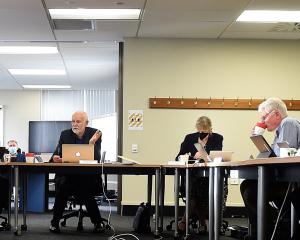A Dunedin man's ''tragic death'' from a toxic overdose of rheumatoid arthritis medication could have been prevented if a pharmacist had picked up a doctor's prescribing mistake, a coroner has found.
The death of Kenneth Jeffrey Douglas (72) from gastrointestinal haemorrhage due to methotrexate toxicity, on July 13, 2012, was ''preventable'', coroner C. J. Devonport said in a written decision.
While his doctor, Dunedin South Medical Centre's Dr Anne-Marie Tangney made the initial mistake, typing ''daily'' rather than ''weekly'' on his prescription, pharmacies were supposed to provide checks, Mr Devonport said.
There were eight opportunities in the dispensing process where the mistake could have been picked up, an investigation by New Zealand College of Pharmacists executive board member Bernie McKone, of Dunedin, found, the coroner said.
''Unichem South City Pharmacy failed to adequately provide those checks. Had pharmacists and staff at the pharmacy done so, Mr Douglas' tragic death may have been prevented.''
As a result, Mr Devonport had referred Mr Douglas' death to the Ministry of Health medicines control team to review dispensing procedures at the pharmacy.
Following the incident, the Pharmacy Council had put a counsellor to mentor and assist the pharmacist involved and gather more information on the person's practice.
The pharmacist, who was not named in the findings, was judged to be competent after a year of mentoring.
Mr Douglas had suffered from rheumatoid arthritis for 20 years and was put on methotrexate in 2010 after attending the Dunedin Hospital rheumatology clinic.
The drug was also used to treat cancer and severe psoriasis and was always given as a weekly dose.
Patients were carefully monitored for adverse effects on bone marrow and the liver.
Mr Douglas was taken off the medication when his liver showed adverse effects but was put back on the medication when his liver function was back to normal.
However, the dose was reduced and he required three 2.5mg tablets, instead of the one 10mg tablet he had taken previously.
Dr Tangney said she believed Mr Douglas fully understood the plan was for him to take a lower overall dose and the three tablets were meant to be taken once weekly.
She acknowledged she failed to double check each item on the prescription when signing it, Mr Devonport said.
Mr Douglas took the prescription to Unichem South City Pharmacy on May 18, 2012, where the error was not noticed.
It was believed Mr Douglas started taking the medication on June 15 and his immune system quickly became severely compromised, the findings said.
A blood test on June 29 showed an abnormal blood count and he also had a sore throat and mouth ulcers, which another doctor picked up as possibly being methotrexate toxicity and organised for Mr Douglas to be admitted to hospital.
He was found to have uncontrollable bleeding in his gastrointestinal tract and was considered too unstable for surgery. He was transferred to the intensive care unit, but died the next day.
Mr Devonport said he was satisfied appropriate steps had been taken by Dunedin South Medical Centre, the hospital's rheumatology department, the Pharmacy Council and Unichem South City to prevent other deaths in similar circumstances.
He also recommended the Royal New Zealand College of General Practitioners get doctors to specify the day of the week on which medication was to be taken and that all medication alerts available on medical software be activated.
Another recommendation was for the Ministry of Health medicine control team to check software alerts were activated when auditing pharmacies.











